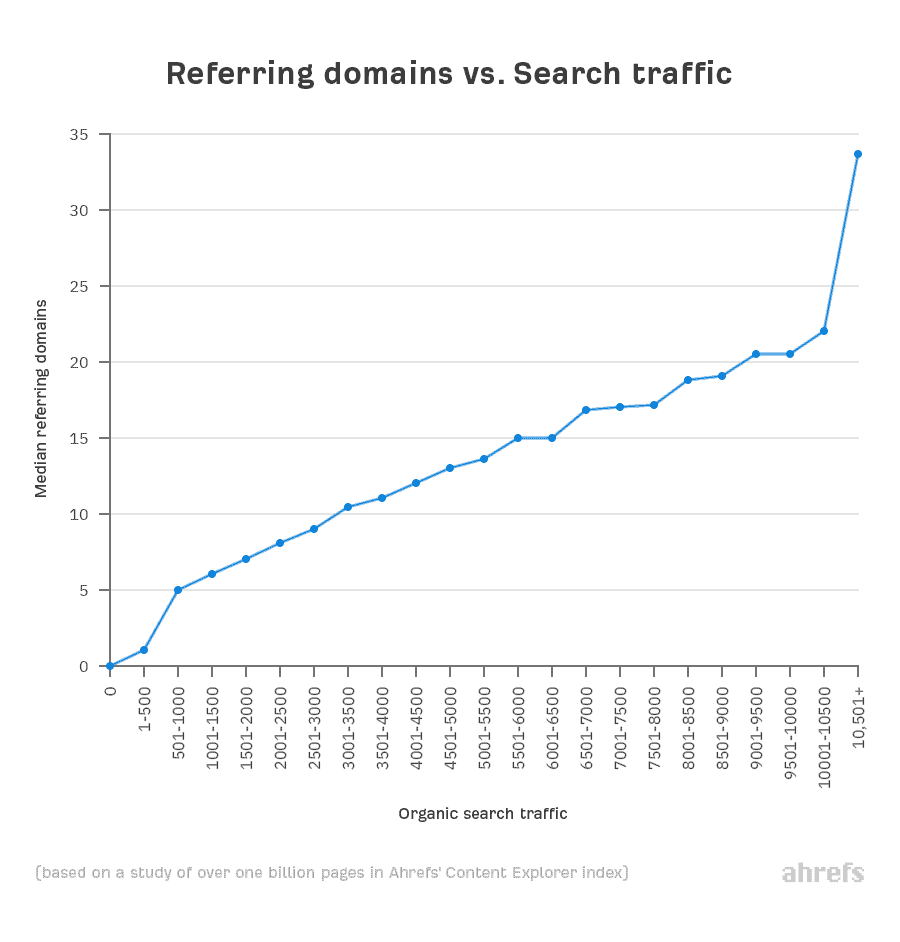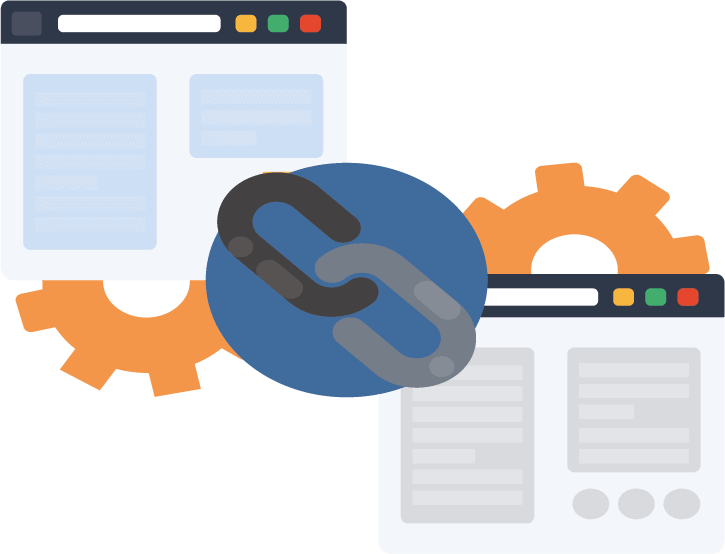What you will learn
- Definition: OffPage Optimization
- Why backlinks are so important
- How to recognize good and bad backlinks
- Link building tips for your OffPage SEO
- Further OffPage measures

What is OffPage Optimization?
Off-page optimization includes all measures to increase organic visitor numbers that take place outside (off-page) a website. This is primarily about building backlinks and publicizing the website.
It is therefore a sub-area of search engine optimization that forms the counterpart to on-page optimization.
Why is this important?
Although Google has been preaching for some time that we should not focus too much on backlinks, they still play an important role in search engine optimization.
The number and quality of a website’s backlinks correlate positively with the rankings in the search results. Such studies have been carried out several times and the results have always been clear.

This is not surprising. After all, a link is a kind of recommendation in the offline world. And since search engines like Google always want to deliver the best results, they also rely on these recommendations.
Backlinks & OffPage SEO
Backlinks are one of the most important off-page factors. A backlink is nothing more than a link from another website to your site.
In essence, it is always the same, but a distinction is made between 3 different types of backlinks.
Directory links
Links from directories play an important role in local search engine optimization. The value of these links is not particularly high, after all it is very easy to get them, but you should always start off-page optimization here.
There are countless different web directories that specialize in specific regions, industries or niches. Find the directories relevant to you and create a profile there.
Important: Make sure that the information in the entries is as uniform as possible. These should also match the information in your Google MyBusiness profile (if available)!
Common directories are e.g:
Outreach links
These types of links were built manually through outreach activities. This includes writing guest articles for other blogs. These links represent the majority of offsite optimization.
Organic links
Organic links, on the other hand, are everyone’s dream. They arise naturally. You did not actively take care of link building, but other webmasters voluntarily linked to your content because they found it useful.
These links often have the greatest value, but are also the most difficult to obtain. Not least because your website must first enjoy a certain popularity for your content to be found at all.
Attention: Not all links are the same
I have already talked a few times about the “value” of a backlink. What exactly does this mean?
It used to be that the sheer number of links to your own website was decisive. Quality played virtually no role.
The result was that low-quality websites could easily be given a high search engine ranking. All you had to do was write a few scripts and you could build thousands of backlinks per day.
This is no longer the case today. The quality of a link is now largely responsible for the resulting value. With “bad” links you can even risk a penalty and worsen your rankings!

What is a good backlink?
A “good” backlink comes from a reputable source, which itself has many “good” links and is as relevant to the topic as possible.
So if you have a blog about pet food, a backlink from a pet care blog will benefit you more than a link from a car repair shop.
Which backlinks should I avoid?
The “bad” backlinks are all those links that were obtained automatically or via spam tactics. So beware of offers such as “30 high quality backlinks” for a price of 30€ or similar.
At best, these links are useless. In the worst case scenario, you will receive a Google penalty and be removed from the index.
Another popular link building measure is buying backlinks on more or less reputable sites. This is where opinions differ. I would generally advise everyone against these link building “strategies”, as they violate Google’s guidelines.
If you still want to take the risk, you should at least know exactly what you are doing. Take a look at the next section to find out how to do link building correctly!
Summary
Not all backlinks are beneficialConcentrate on links from reputable and relevant websites. Avoid automatically generated spam links and links from dubious sources at all costs.
Building links for off-page optimization
Now enough of the preamble. Let’s take a look at the most common ways you can build backlinks for your off-page optimization and improve your search engine rankings!
Create content that generates links naturally
Does this tip sound like Captain Obvious? Maybe it is, but it is too often overlooked. If you create really good content, it will not only be loved by search engines and rewarded with higher rankings. Other bloggers and website operators will also link to it themselves!
Admittedly, this will not happen very quickly or very often. But there are a few tricks you can use to build more natural links.
Infographics
We all love infographics. They put complicated issues into an easy-to-understand picture.
As we have unfortunately become relatively lazy, hardly anyone bothers to create their own infographics. In addition, ready-made graphics are already available on the Internet for almost all topics.
But what do we do if we then use such a graphic in the content of our own website? Right, we include the source and link to it! (At least that’s what we should do, copyright is no joke)
If you are the one who created this graphic, what happens? You generate lots of backlinks in a completely natural way.
Studies
In addition to infographics, studies and research results are also a good way to expand your reputation and build new backlinks.
The results will be cited by other bloggers, and search engines also love high-quality, scientific content.
Broken Link Building
This method is not necessarily an insider tip, but is still unknown to many beginners and very effective.
The principle works like this: You search for a blog article that deals with a similar topic to your own article. This blog article will most likely contain links to other pages. If you find a “dead” link, i.e. a link that generates a 404 error, contact the webmaster and offer them your article as an alternative instead.
If the other page does not yet contain a link to your topic, suggest to the respective operators that they could refer to your website in a suitable place.
The other website operators will often gratefully accept your suggestion, because they don’t want dead links in their articles either. The prerequisite is, of course, that the topic fits and that your content is of good quality.
Searching for these links manually is quite a pain, fortunately the Content Explorer from Ahrefs offers exactly this function.
Apart from that, you can also use the ScreamingFrog for this technique.
Outreach & guest articles
Outreach campaigns and guest posts are one of the most common measures of off-page optimization.
We have already briefly explained the outreach principle: You write a message to the operators of other websites in which you pitch your content. Make them aware that your content is useful for their readers. If you are lucky, you can convince them and they will link to your site.
However, please do not be too aggressive and accept that not everyone will answer you or follow your suggestion.
The more personalized your cover letter and the more relevant and useful your content, the more success you will have with these measures.
The situation is relatively similar with guest posts. The difference here is that you publish your own article on another webmaster’s website – ideally with a backlink to you.
This allows you to use the reach and influence of others to your advantage. In return, you provide them with a nice content piece that they can use to generate more traffic for their website. You can also improve your general reputation and establish exciting collaborations!
Summary
Create content that is worth linking toInfographics and studies are a great way to generate links naturally. You can speed up this process even more with manual outreach measures.
Further measures
In addition to building backlinks, there are other options for off-page optimization. The following tips may not be a direct part of search engine optimization, but they do generate organic traffic. And at the end of the day, that’s what we’re all about!
Use social media
Social media has become an important part of online marketing. Which platform is more effective for you differs from industry to industry, but they all have one thing in common: you can build your reputation and use the channels for your marketing.
Use your reach for your content marketing. Share your content online! If you haven’t built up a large number of followers yet, look for influencers in your industry. Offer them collaborations and use their reach for your content.
Once you have made a name for yourself, you will also gain organic visitors via social media. Although it is controversial to what extent search engines include so-called “social signals” in their evaluation of websites, it won’t do you any harm!
Use YouTube
YouTube is also a very good content marketing channel. You can also use this to build up a fan base and attract new visitors. The best thing about this is that you can also embed your videos in your articles.
Search engines like Google prefer video content, so they will also help you with the ranking of your articles. In addition, videos are always displayed at the top of the search results, which can help you get a lot more traffic.
Summary
Also use other traffic channelsGoogle is not the only source of organic visitors. Also use other channels such as social media, YouTube and co.
Conclusion
Off-page optimization plays an important role in SEO. Essentially, it’s about making your website known on the web and building links.
Since Google rankings correlate very strongly with the number of links, no one should ignore off-page methods when optimizing.
Off-page optimization will significantly help you to increase your influence, improve your positioning in the search results and drive more visitors to your website.

